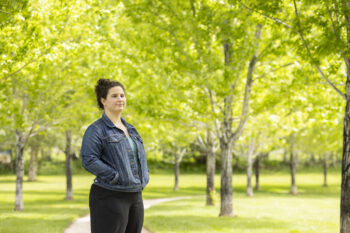 At just 19 years old, Faye, an avid swimmer and college freshman at Northeastern University, found her life plans on hold when she began experiencing fevers and flu-like symptoms.
At just 19 years old, Faye, an avid swimmer and college freshman at Northeastern University, found her life plans on hold when she began experiencing fevers and flu-like symptoms.
When her temperature reached 104 degrees, Faye called an Uber and headed to the nearest emergency department.
While at Boston Medical Center, providers discovered Faye had an abnormally low white blood cell count and kept her overnight.
“The minute they walked in, I knew something was deeply wrong,” recalled Faye.
The doctors explained to Faye and her mom, Molly, that her blood was filled with abnormal, immature white blood cells called blasts; they believed she had leukemia.
Words like “cancer” and “chemotherapy” filled the room, and Faye felt a burning sensation run down her spine while the rest of her body went numb. At the same time, her mom broke down.
“I’ll never forget the sound of her voice when she called my dad to tell him,” shared Faye. “She just lost it.”
Finding the right place for young adults with cancer
Faye was transferred to Boston Children’s Hospital, where doctors confirmed she had B-cell acute lymphoblastic leukemia.
Faye had to make difficult, life-altering decisions right away, including where to go for treatment. Her family home was in Hailey, ID, so Faye looked for a hospital in that region.
She chose Seattle Children’s, where about a third of patients with cancer are teens or young adults. Seattle Children’s also has an Adolescent and Young Adult (AYA) Cancer Program with internationally recognized providers who care for and support patients into their late 20s with all forms of cancer.
“There’s a lot of data out there demonstrating that teen and young adult patients with leukemia, like Faye, do really well when they’re treated with the pediatric protocols we specialize in,” explained Dr. Colleen Annesley, Faye’s primary oncologist. “We have the expertise to treat the toughest cases and help our patients survive and thrive.”
Teen and young adult patients with cancer at Seattle Children’s also have access to many clinical trials, some that are not available at other cancer centers, so that they get the best available therapies right away.
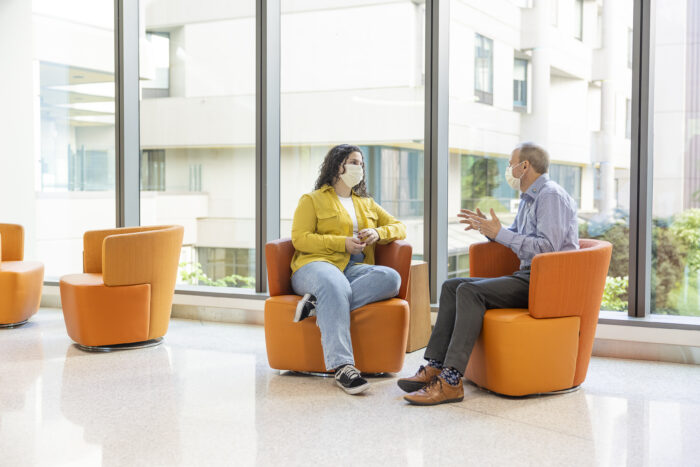
“We treat these patients as young adults who are starting to make their own decisions, much bigger decisions than most people face in their lifetime,” said Dr. Shireen Ganapathi, Faye’s oncology fellow.
Seattle Children’s specialized Social Work team offers age-appropriate non-medical services to help AYAs, many who have never navigated the medical system before, go through cancer treatment while also navigating other major changes in their lives.
“We have wraparound care that is really important for teen and young adult patients,” added Dr. Tyler Ketterl, medical director of Seattle Children’s AYA Oncology and Fertility Care and Preservation programs.
Seattle Children’s AYA program offers patients access to mental health providers with experience treating teen and young adult oncology patients. The program has support groups where patients can connect with one another as well as gaming and art therapists who can help patients cope during treatment.
“We want patients and families to know they don’t have to do this alone,” shared Joanna Patten, clinical director of Cancer Care Psychosocial Services at Seattle Children’s.
“At Seattle Children’s, you can let go,” explained Faye. “You can retreat into the cocoon of childhood when facing something so horrible. It’s like having your security blanket, and Seattle Children’s is the blanket.”
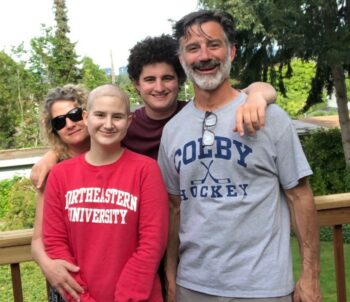
Cancer treatment and new options for AYAs
Faye was treated with an aggressive chemotherapy regimen, which she tolerated well, often smiling and laughing with her care team even while dealing with mouth sores, pain and fatigue.
“I remember Faye approached every challenge with this incredibly positive attitude,” recalled Dr. Ganapathi. “She demonstrated resilience every step of the way despite the challenges that she faced during her treatment.”
Unfortunately, the chemotherapy was not as effective as Faye’s care team hoped it would be, and there were still leukemia cells in Faye’s bone marrow after her second round. This meant her disease would be especially difficult to treat.
Faye’s oncology team recommended she have a bone marrow transplant, a treatment that would wipe out her immune system and replace it with immune cells from a donor. The team was confident a transplant would offer Faye the best chance of survival, but they expected it would also make her infertile.
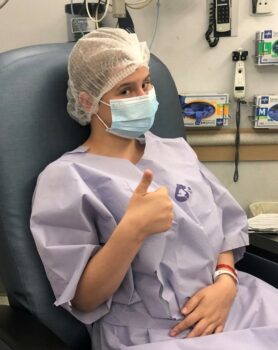
“Up until that point, I hadn’t really thought about whether I wanted to have kids,” said Faye. “But when I realized I might never be able to, I broke down.”
Faye asked her oncology team if she could freeze her eggs, but since her cancer was too aggressive, she couldn’t pause chemotherapy long enough to undergo the necessary ovarian stimulation and retrieval of her eggs.
There was only one option to preserve Faye’s fertility: She could have doctors surgically remove one of her ovaries before her transplant through ovarian tissue cryopreservation (OTC) and freeze it until she was ready to use the tissue for family building.
Unlike egg freezing, ovarian tissue can be removed and frozen at any time, without interrupting chemotherapy or other cancer treatments. Seattle Children’s is the only pediatric cancer center in the Pacific Northwest that offers OTC, and Faye was its first patient to do so.
“When I meet with patients and talk about the impact of cancer therapy on fertility, it’s often the first time I see them get emotional and think about the long-lasting impacts of cancer therapy,” explained Dr. Ketterl. “But when we talk about fertility preservation options, we see their hope come back. Someone is thinking about them surviving and having a full and meaningful life.”
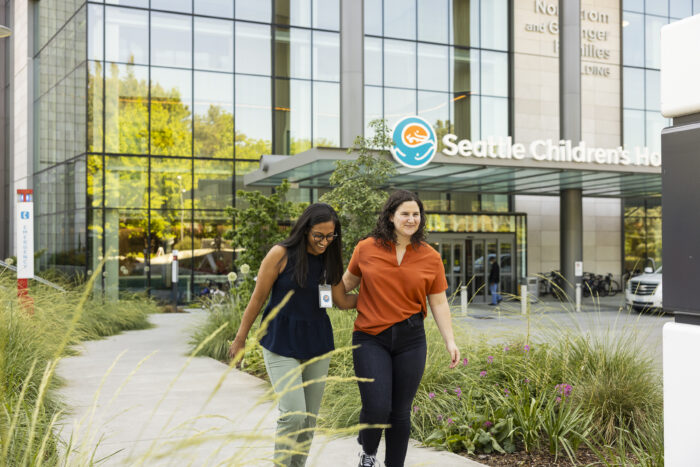
Diving back in and building a path forward
Faye went on to have a successful bone marrow transplant and has been in remission ever since. She transferred to the University of Washington and is back in school majoring in French.
“Faye is doing incredible things,” said Dr. Ganapathi. “After all her intensive therapies, she is succeeding. That’s what we love to see, patients going on to live healthy, meaningful lives.”
Faye is also swimming again.
“The first time I was able to be in a pool after treatment was very special,” said Faye.

She continues to receive care through Seattle Children’s Cancer Survivor Program, which provides long-term, follow-up care to help patients stay healthy long after their cancer treatment ends.
“I was in the best place to receive cancer treatment,” said Faye. “Forty years ago, my cancer probably would have killed me; I certainly wouldn’t have had the opportunity to freeze tissue from my ovary. I’m really grateful to my care team and everyone who helped me get to where I am today.”
Adolescents and young adults with cancer have different challenges than children or older adults. For more than a decade, U.S. News & World Report has consistently ranked Seattle Children’s cancer program among the best in the nation.
Seattle Children’s Adolescent and Young Adult (AYA) Cancer Program gives expert medical care and support to teens and young adults into their late 20s with all forms of cancer. Learn more here: Adolescent and Young Adult Cancer Program – Seattle Children’s (seattlechildrens.org)
Resources:
- Acute Lymphoblastic Leukemia – Seattle Children’s Hospital (seattlechildrens.org)
- Cancer and Blood Disorders Center – Seattle Children’s (seattlechildrens.org)
- Conditions Treated at the Cancer and Blood Disorders Center (seattlechildrens.org)
- Fertility Preservation at the Cancer and Blood Disorders Center (seattlechildrens.org)
- Cancer Survivor Program at the Cancer and Blood Disorders Center (seattlechildrens.org)
- Support Groups – Seattle Children’s (seattlechildrens.org)

